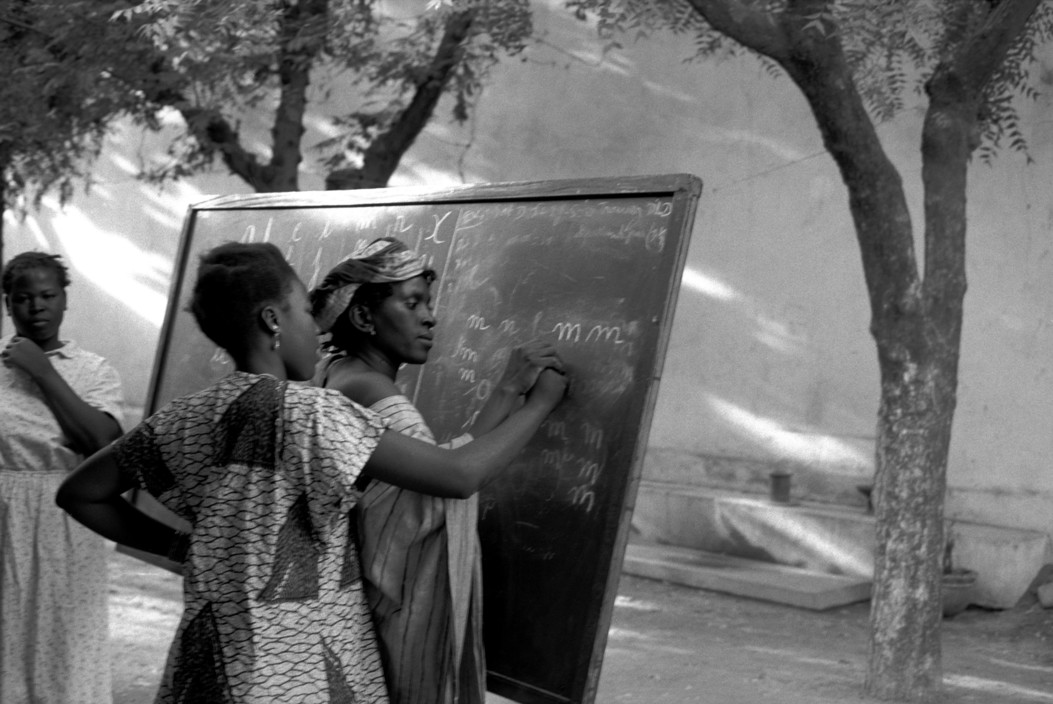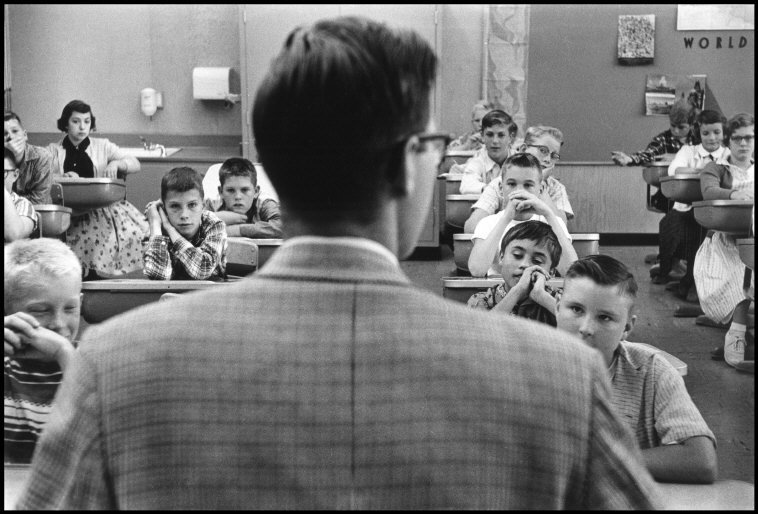Sarah Hildebrand
My teaching persona is carefully crafted—a performance I give every time I step into the classroom. I am, in essence, me. But I’m well-aware of how I can change a space by the way I move within it. I tend to wander the room as I talk. I gesture with my hands and almost never sit down unless it’s on top of a desk. Students tell me I “never stop smiling.”
I am professional but largely informal. While discussing course readings, I often joke with my students or tell relevant personal anecdotes to get them thinking about how texts intersect with reality. Although I know some instructors prefer to place a veil of anonymity between themselves and their students, I’ve found that disclosing small facts about my life can help catalyze course discussion. Students begin sharing their own personal experiences, asking me more questions about myself, and ultimately learning the critical thinking skills I was trying to teach them in the first place by critiquing what might be my own biases.
Somewhere mid-way through the semester, they realize that, although I am their instructor, I do not actually live in office 393 of Carman Hall—that my identity, like theirs, is multifaceted. And as they come to view me on a more personal level, I notice that class participation begins to rise. While I don’t answer every question students ask me, what follows is a list of some of the ones I have, along with my thoughts on how disclosing even small portions of our identities might have a strong impact on learning:
- “Are you white?”
My English Composition course had been discussing the work of Claudia Rankine, focusing in on a section of her collection Citizen, which emphasizes the theme of race and the draws awareness to violence caused by microaggressions. We were digging deep into the role of race in America through close-reading the text when my students began sharing personal experiences, having been given a new vocabulary with which to describe them.
Midway through class, one of my brightest students asked me what seemed like a simple or even obvious question: “Are you white?” A few students giggled, while others seemed a bit shocked. While they were used to fending off my own questions or testing me on course-related concerns, never had anyone probed an aspect of my identity. I answered “Yes” and enquired as to what had prompted her question. She countered with an increasingly insightful follow-up: “How do you feel as a white professor talking to students of color about race?”
I paused, and my face probably flushed. There wasn’t a single “white” student in the room. Still mulling it over and speaking a bit off the cuff, I responded, “Honestly, sometimes I feel weird. When we enter this territory, I am no longer the expert in the room, and I don’t want what I say to come off as me preaching to you about an experience you’re way more familiar with than I am. However, I believe it’s an important topic for discussion, because progress will only happen if we work together. Teach me what I need to know, and if I ever handle a conversation poorly, please tell me.”
I have always valued the role of the “ordinary expert” and the weight of personal experience. I also strive to decenter authority within the classroom from the very way I set up the physical space through the oft-made-fun-of literature circle to the way I encourage students to guide our course discussions rather than relying on me to walk them though. I make it clear that I am not the center of all knowledge, and that I am often present simply to moderate discussion.
I then nervously flipped the question back on them: “How do you feel being taught about race by a white professor?” At this point in the semester, we had already established a rapport. They told me that in my class, “It’s cool,” but with other professors they sometimes feel uncomfortable. Their mixed response suggested that the academy is far from immune from the systemic forms of oppression that occur daily on the streets of New York City. It also hinted that pedagogy is made up of more than a mastery of content, but also an ability to allow space for students to take control of their own learning, sometimes by challenging the assumed “expert” in the room. In retrospect, I view this question as an important meta-moment that perfectly demonstrated the skill I was ultimately trying to teach. And my willingness to engage and admit my own reservations also lead to an openness in the classroom that continued throughout the semester as students became less concerned with always having the “right” answer.
- “How old are you?”
Every class I’ve ever taught has been fascinated by my age. I’ve actually always refused to answer this question, partially due to my own insecurities. A certain respect is garnered by age. And even though I’m confident in my ability to perform my job, I often fear at the start of the semester that students (many of whom are older or “non-traditional”) will lose respect for me once it’s boiled down to days spent on this planet.
But I also refuse to answer because the question greatly entertains me—I become fascinated myself over the way students agonize over (what I consider) a largely arbitrary subject. Sometimes, I tell them to guess. These guesses have ranged wildly—anywhere from 23-40. For any of my students who stumble upon this article, I’ll reward your reading and research by admitting to you that I am currently 28-years-old. But what this vast range of guesses has taught me is that, while I do look incredibly young for my age (will I ever stop being mistaken for a student by Human Resources?), the way I carry myself and the position of authority I tentatively hold within the classroom often makes students assume I am older. Most place me somewhere in my 30s, which I take as a compliment—that in 28 years, a majority of students believe I’ve acquired over three decades of knowledge.
When I taught my first class, I was also surprised by how many students were genuinely excited to have a “young” instructor. My initial fear had been the opposite—that my age and appearance would work against me, leading students to believe they had somehow been duped since I did not fit the grey-haired professorial stereotype. What I learned from their excitement was that relatability is often a core value students look for within their teachers (although this can certainly be achieved regardless of age).
- “Why are you here? What motivates you to teach?”
This is a series of questions several students have asked around mid-semester, perhaps as they begin questioning the role of their own education and where they hope to end up after securing their degrees. This answer I’ve always gifted more freely. I explain to them my own experience as an undergraduate. How I fell on hard times and there were a few professors who were invested enough in their jobs and in me to check-in and offer resources. I tell them how my junior year, I almost dropped out, but that faculty stepped in to make sure I made educated decisions regarding my future. I tell my students that I want to be that person for someone else. I tell them that I love reading and writing, that I view conversation as crucial to instigating change, that I think these skills are valuable in both their professional and personal lives—but that my larger goal is to pay it forward. I am here because I want to help people in need, and to be the kind of professor who stopped me from impulsively slamming the self-destruct button.
“Wow,” some students say, while others fall into momentary silence. I pinpoint this as the moment they realize I care about them not just as students, but as human beings, which often saddens me because I realize my response is such an unexpected one. This lingering thought ties into another question I’m often asked:
- “How are you so happy all the time?”
What I would like to say is: “I’m happy because I get to work with you, students. Because life is filled with suffering, but you are my distraction even when you’re suffering yourselves.” Of course, this is not what I say. I do tell them that I am happy because I genuinely love my job. I also jokingly tell them that I at least have to appear happy, because if I didn’t, they might never look up from their cellphones. The way I engage my students at the start of class is either by breaking their silence by asking them questions or nosily jumping into their ongoing conversations. I am always smiling and bubbly. And because I am ready to engage with them, they become ready to engage with me. And finally, the most infamous question of all:
- “Why are you such a tough grader?”
“Because I have high standards and know you can reach them.”
While the majority of instructors ask their students to introduce themselves on the first day of class, we often forget to introduce ourselves. Creating a one-sided model for communication fails to foster the intimacy needed to build relationships and ultimately forms barriers to learning. Recently, I polled my students, asking them what they’d always wanted to know about me or their other professors but never had the opportunity to ask. The majority of their questions revolved around our personal lives—if we’re married, if we have kids, pets, or hobbies. Along with my favorite question of all: “Do you have a life?”
What I gained from this dialogue was that students are just as curious about us as we are about them, and if we don’t offer them sides of ourselves other than our research, they will only see us one way. Many students have little idea as to what an average day as a professor looks like. And just as we might cut the student who asks for a paper extension more slack than the one who turns it in late for what we assume is “no reason,” my class confided in me that they’re more willing to be lenient with us if we are likewise more open with them—for example, if we preface a delay in turning back grades by explaining we are going out of town or dealing with issues of our own. Of course, any relationship needs to set boundaries. Perhaps I will never voluntarily tell students my age (I assume eventually I’ll look old enough that they’ll stop asking). But the act of storytelling or even exposing the slightest bit of the methods behind our perceived madness can help humanize us to students, foster a more open classroom atmosphere, and serve as a reminder that they are more than just students, as well.


